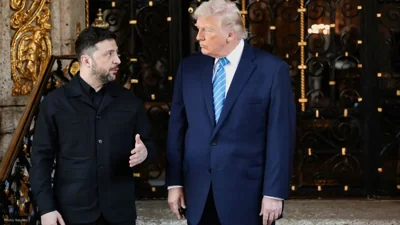
Post by : Rajat
Syria, Sudan, and Washington’s Foreign Policy Crossroads
The complex intersection of Middle Eastern and African crises has taken a new turn, as Syria, Sudan and the road to Washington become central to evolving global diplomacy. These two war-torn nations — one caught in a protracted civil war and the other spiraling into chaos — now intersect with American foreign policy interests like never before. While each country’s crisis is distinct in origin and dynamics, both are compelling Washington to reevaluate its regional strategies. In a world where humanitarian urgency, power struggles, and geopolitical calculations blend into every decision, the path forward involves more than just diplomacy — it involves reshaping America's global role.
Syria: A Long War With No Clear End
Syria has remained a focal point of global attention for over a decade. What started as a civil uprising in 2011 has turned into a multilayered conflict involving regional and global powers. The Assad regime, backed by Russia and Iran, has withstood international pressure and internal rebellion, effectively reasserting control over much of the country.
However, the humanitarian cost has been staggering. Over 500,000 Syrians are estimated to have died, and more than 6 million have become refugees.
In recent months, Syria has once again come into the limelight, not just due to fresh clashes in Idlib, but also because of renewed discussions in Washington about the U.S. military presence in northeastern Syria. With ISIS remnants still active, and Kurdish allies urging support, America faces a difficult decision: stay and stabilize, or withdraw and risk chaos. The Biden administration has signaled that while Syria may not be a top priority, its strategic importance — especially in curbing Iranian influence and ensuring counterterrorism — cannot be ignored.
Sudan: A Nation on the Brink
Sudan's transition from dictatorship to democracy, once hailed as a model for the region, has descended into deadly conflict. The struggle between the Sudanese Armed Forces (SAF) and the paramilitary Rapid Support Forces (RSF) has turned urban areas into battlegrounds, especially in Khartoum.
Thousands have been killed or displaced, and the conflict has triggered severe humanitarian consequences across the region, especially in neighboring Chad and South Sudan. The fighting, fueled by deep political mistrust and competing international interests, risks destabilizing East Africa. For Washington, Sudan is not just a humanitarian concern — it’s also a matter of influence. China, Russia, and Gulf nations have long played a role in Sudan’s affairs, and the United States now faces the challenge of reasserting diplomatic clout. In April 2025, the U.S. convened high-level talks involving African Union and UN representatives to push for a ceasefire. But progress remains fragile.
Why Washington Can’t Look Away
Syria, Sudan and the road to Washington is more than a headline. It's a signal of how America's global posture is being tested on two fronts: the Middle East and Africa. With growing skepticism about international engagement among American voters, policymakers must strike a delicate balance.
So why is Washington re-engaging?
Geostrategic Positioning: Syria borders Israel, Turkey, and Iraq — all of which are key U.S. allies or interests. Sudan, on the other hand, has strategic proximity to the Red Sea and is rich in natural resources.
Counterterrorism: Both countries serve as potential breeding grounds for extremist groups. A power vacuum in Syria or Sudan could re-energize terrorist organizations like ISIS or Al-Qaeda.
Humanitarian Pressure: With images of bombed cities, starving children, and desperate refugees circulating on global media, the moral and political pressure for U.S. intervention mounts.
Global Competition: China and Russia are increasing their footprints in Africa and the Middle East. Washington’s reengagement may also be about countering that influence.
A Shift in U.S. Foreign Policy?
The Biden administration has largely followed a foreign policy doctrine focused on "strategic patience" and multilateralism. Yet Syria, Sudan and the road to Washington reveal the challenges of that approach.
While the U.S. has increased humanitarian aid to both regions — pledging over $500 million in relief packages — critics argue that more decisive political intervention is required. There's growing bipartisan support for appointing special envoys, reestablishing diplomatic channels, and potentially using sanctions to influence warring factions. Moreover, the role of American allies, particularly in Europe and the Gulf, will be critical. Cooperation with France and the UAE, both with interests in Africa, and ongoing coordination with NATO partners may define the outcome of U.S. efforts.
The Human Stories Behind the Headlines
Amid the political and strategic calculations are real people — mothers carrying their children across borders, doctors operating in makeshift hospitals, and youth with dreams put on hold.In Syria, a new generation of children has grown up knowing nothing but war. In Sudan, university students now carry rifles instead of textbooks. These are not just statistics — they are urgent reminders of why global engagement, however complicated, remains essential.
Disclaimer
The content published on Middle East Bulletin is intended for informational purposes only. While we strive to ensure accuracy, completeness, and timeliness, we make no warranties or representations of any kind, express or implied, about the reliability, suitability, or availability of the information, opinions, or news presented on this platform.
Photo:Instagram/@mysyria










Kathmandu Mayor Balendra Shah Aligns with Rastriya Swatantra Party Ahead of Upcoming Polls
Mayor Balendra Shah partners with Rastriya Swatantra Party to challenge Nepal's entrenched political

Independent Review of Law Enforcement Initiated in Australia Following Bondi Tragedy
In response to the Bondi shooting, Australia announces an independent review of law enforcement to e

Jaideep Ahlawat Steps in for Akshaye Khanna in Drishyam 3
Akshaye Khanna exits Drishyam 3 over a wig dispute, with Jaideep Ahlawat stepping in as his replacem

Kis Kisko Pyaar Karoon 2 to Make Its Comeback in January 2026
Kapil Sharma’s comedy film Kis Kisko Pyaar Karoon 2 is set to return to theatres in January 2026 aft

China Targets 20 US Defense Firms Amid Taiwan Arms Sales Tensions
In retaliation to US arms sales to Taiwan, China sanctions 20 US defense firms and 10 top executives

Salman Khan Marks 60 Years with Heartfelt Celebration at Panvel Farmhouse
Celebrating his 60th birthday, Salman Khan hosts an intimate gathering with family and friends at hi